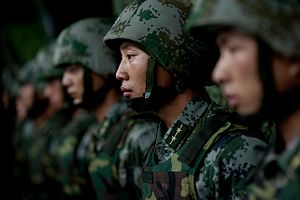The announcement of a formal investigation into former Politburo Standing Committee member Zhou Yongkang represents a watershed moment for China, not only for President Xi Jinping but also for the Chinese Communist Party, which by enshrining the rule of law as the rationale for Zhou’s demise has made itself the final arbiter of that law. As my colleague Shannon pointed out earlier, Xi is now likely to look for another target within a different faction of Chinese leadership in order to further solidify his political gains, and perhaps keep his adversaries off balance.
The military for one appears to have gotten the message loud and clear, at least according to its statements in the official Chinese press. However, it is also leaking information and making statements in the wake of the news about Zhou that could be intended to stoke nationalist support for itself at the expense of traditional regional rivals, without directly challenging Xi’s authority or his anti-corruption campaign. Such a tactic would certainly be helpful if the military leadership felt threatened, and would also be relatively low risk.
In response to Zhou’s downfall the military voiced its full support for the investigation, according to its newspaper the PLA Daily. It is certainly hoping that General Xu Caihou, the vice-chairman of the Central Military Commission brought under investigation for graft in early July, will be the last high-profile military target of Xi’s anti-corruption campaign. The paper said “Officers across the army support the probe, as it shows the resolution of the CPC Central Committee to operate with strict discipline and on the principle that all people are equal under the law and regulations,” and that there will be “no exceptions,” no matter who is involved.
Also, the Ministry of National Defense on Thursday for the first time allowed foreign journalists from the AP, Reuters, Asahi Shimbun, ITAR-TASS and the Press Trust of India to attend its monthly press conference in an attempt to be more transparent. Speaking to reporters, the Defense Ministry spokesperson Geng Yansheng said “We hope that attending this regular press conference can help you in reporting military issues in China and that you can help the world view China and its military in a more objective and truthful way.” However, he also took time to point out that the PLA’s soldiers supported the CPC’s investigation into XuCaihou.
Alongside the military’s acquiescence to the CPC’s anti-corruption campaign, it has not lost the opportunity to highlight progress in programs that would be highly popular with the nationalist faction of China’s population. On Friday the military appears to have tacitly acknowledged the existence of its Dongfeng-41 (DF-41) intercontinental ballistic missile (ICBM). It is an improvement over the DF-5A, with a range of 12,000 km that is capable of delivering multiple nuclear warheads to the continental U.S.
The military also announced the establishment of a joint air and naval command center in order to monitor the Chinese air defense identification zone (ADIZ) over the East China Sea. According to the online media outlet Ta Kung Pao based in Hong Kong, the command center is intended to monitor Japanese Maritime Self-Defense Forces activity, and could have up to 300 fighter aircraft under its authority.
The Chinese military is justified in its fear of further being targeted by Xi’s campaign, especially as the campaign appears to be picking up steam. While visiting a military base in Fujian province on Friday, Xi said he would continue to strike against military graft, and for troops “to remember where their priorities lie.” The loyalty of the rank and file of the PLA’s soldiers appeared to be his main goal, as he admonished soldiers to avoid the “four customs” of formalism, bureaucracy, hedonism and extravagance. He also told them that “the party’s absolute leadership over the army should be unswervingly adhered to.”
China’s military leadership knows that the chances of being targeted again by Xi’s “rule of law” campaign are high, and are likely to remain so. Once an incredibly powerful political force, the military’s authority has eroded somewhat over the last two decades. With the downfall of Xu and now Zhou, the PLA leadership finds itself in increasingly uncertain territory. One of its remaining levels of influence is the ability to stoke public support with policies aimed at nationalist rivals like Japan and the U.S. While this is admittedly an unwieldy tool at the best of times, the PLA may feel the need to use it if many more within its leadership feel they are Xi’s next target. Xi for his part has been very shrewd so far, not making his move until he is sure he has completely isolated his target and has the necessary political support. As this game of cat and mouse plays out, Xi will have to be increasingly careful with a portion of the government that has a natural ability to defend itself.

































